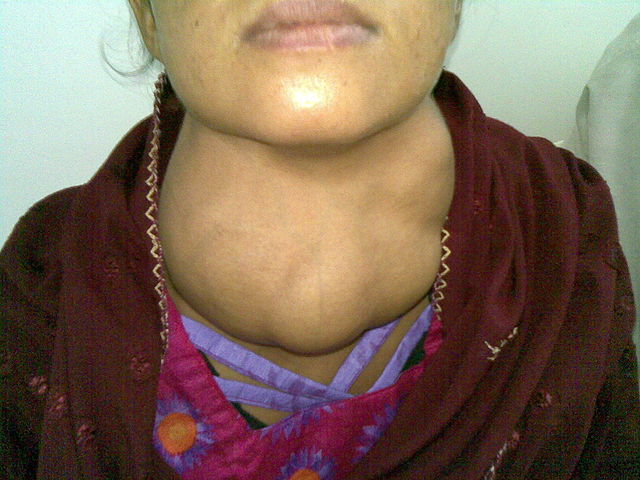Goitre, a condition characterized by the enlargement of the thyroid gland in front of the neck, is a common condition. It can indicate underlying thyroid disorders or iodine deficiencies, necessitating attention and proper management.
What is Goitre?
Goitre manifests as the abnormal swelling of the thyroid gland, located in the neck just below the Adam's apple. This enlargement can be seen or felt, causing a noticeable lump or fullness in the throat. While goitre itself may not pose immediate health risks, it can signify an underlying thyroid condition, such as low thyroid hormone, high thyroid hormone, iodine deficiency or rarely cancer.
Causes of Goitre:
- Iodine Deficiency: Insufficient iodine intake, which is essential for thyroid hormone production, is a leading cause of endemic goitre in regions with low dietary iodine levels. Eating iodine-supplemented food, grains and salt helps prevent this type of goitre
- Thyroid Disorders: Conditions such as hypothyroidism (underactive thyroid) and hyperthyroidism (overactive thyroid) can trigger goitre as the thyroid gland attempts to compensate for hormonal imbalances.
- Autoimmune Diseases and Cancer: Autoimmune thyroid disorders are disease conditions where the body mistakenly attacks its own self. This may affect the thyroid too. Rarely the thyroid growth may be cancerous.
- Genetic Factors: Some individuals may have a genetic predisposition to developing goitre, particularly if family members have a history of thyroid disorders. This may also explain why it is commoner in women.
- Environmental Factors: Exposure to certain environmental toxins or radiation can contribute to thyroid dysfunction and goitre formation.
Symptoms of Goitre:
- Visible swelling or enlargement of the neck
- Feeling of fullness or tightness in the throat
- Hoarseness or difficulty speaking or swallowing
- Coughing or choking sensation
- Breathlessness, particularly when lying down
- Symptoms of underlying thyroid disorders, such as fatigue, weight changes, or changes in heart rate
Diagnosis and Treatment:
Diagnosing goitre typically involves a thorough medical history, physical examination, and additional tests to identify underlying causes and assess thyroid function. These tests may include:
- Thyroid function tests (TFTs) to measure levels of thyroid hormones and thyroid-stimulating hormone (TSH)
- Thyroid ultrasound imaging to visualize the size and structure of the thyroid gland
- Fine-needle aspiration biopsy (FNAB) to evaluate any suspicious nodules or masses within the thyroid gland
Treatment for goitre depends on its underlying cause and severity. Options may include:
- Iodine Supplementation: In cases of iodine deficiency, increasing dietary iodine intake or using iodine supplements can help reduce goitre size and improve thyroid function.
- Medication: For thyroid disorders such as hypothyroidism or hyperthyroidism, medications like thyroid hormone replacement or antithyroid drugs may be prescribed to regulate hormone levels and shrink the goitre.
- Surgery: In instances of large or symptomatic goitres, surgical removal of part or all of the thyroid gland may be necessary to alleviate compression symptoms or address concerns about thyroid cancer.
- Radioactive Iodine Therapy: This treatment, typically used for hyperthyroidism, involves the ingestion of radioactive iodine, which selectively destroys thyroid tissue, reducing goitre size and hormonal overproduction.
- Lifestyle Modifications: Adopting a balanced diet rich in iodine, selenium, and other essential nutrients, along with regular exercise and stress management, can support thyroid health and prevent goitre formation.
Conclusion:
Goitre represents a common manifestation of thyroid dysfunction, often stemming from iodine deficiency, thyroid disorders, or genetic predisposition. While usually benign, goitre warrants medical evaluation to determine its underlying cause and appropriate management. With early diagnosis and tailored treatment, individuals with goitre can effectively address thyroid concerns and regain optimal health and well-being. As with any medical condition, consulting a healthcare professional is essential for accurate diagnosis and personalized care.
